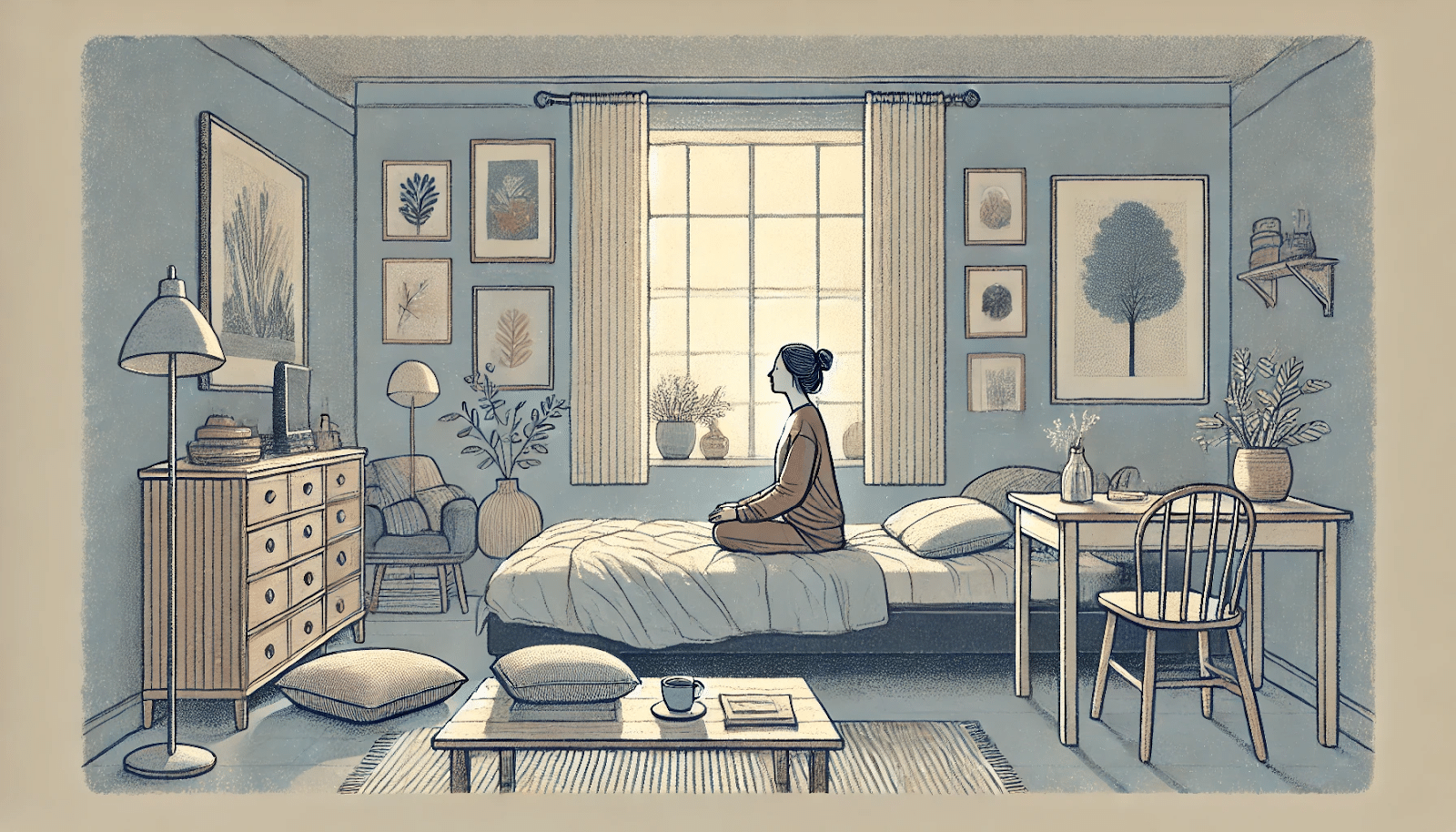Key Takeaways
- Deep breathing exercises can help calm your mind and reduce anxiety symptoms quickly.
- Regular physical activity (e.g., walking or yoga) can significantly decrease anxiety levels over time.
- Mindfulness practices like meditation can help you stay grounded and reduce stress.
- Building a strong support system with friends, family, or support groups can provide essential emotional backing.
- A Mission for Michael (AMFM) provides comprehensive treatment for severe anxiety through a holistic approach that includes evidence-based therapies (e.g., DBT, CBT, and MBSR) and flexible programs (from residential care to outpatient services) that adapt to each individual’s needs and recovery journey.
Welcome to Your Anxiety Relief Guide
What Is Anxiety
Anxiety is more than just feeling stressed or worried. It’s a persistent feeling of fear or apprehension that can interfere with daily activities. When it becomes severe, it can affect your physical health, relationships, and overall well-being.
Why Instant Solutions Matter
When you’re in the midst of an anxiety attack, you need quick and effective solutions. Immediate relief techniques are your first line of defense – they can help you manage symptoms on the spot and prevent them from escalating.
Building Long-Term Resilience
While quick fixes are essential, building long-term resilience is equally – if not more so – important. Developing healthy habits and coping strategies can reduce the frequency and intensity of anxiety episodes over time. This way, you’ll be prepared for both immediate and future challenges.
Founded in 2010, A Mission For Michael (AMFM) offers specialized mental health care across California, Minnesota, and Virginia. Our accredited facilities provide residential and outpatient programs, utilizing evidence-based therapies such as CBT, DBT, and EMDR.
Our dedicated team of licensed professionals ensures every client receives the best care possible, supported by accreditation from The Joint Commission. We are committed to safety and personalized treatment plans.
Recognize Anxiety Symptoms
Recognizing the symptoms of anxiety is the first step toward managing it. Anxiety can manifest in various ways, affecting both your body and mind. But if you’re aware of these signs, you can take action before they become overwhelming.
- Physical symptoms: racing heart, sweating, trembling
- Emotional symptoms: feelings of dread or impending doom, irritability, restlessness, mood swings
- Cognitive symptoms: racing thoughts, difficulty concentrating, overthinking
Immediate Relief Techniques
Deep Breathing Exercises

Deep breathing exercises are one of the most effective ways to reduce anxiety quickly since they slow your heart rate and promote relaxation.
Try this: Inhale deeply through your nose for four seconds, hold your breath for four seconds, and then exhale slowly through your mouth for six seconds. Repeat this process several times until you feel calm.
Quick Grounding Exercises
Grounding exercises help anchor you to the present moment, reducing feelings of anxiety and panic. They involve focusing on the physical sensations around you to distract from anxious thoughts. The two most common grounding exercises are:
- 5-4-3-2-1 Technique: Identify 5 things you can see, 4 things you can touch, 3 things you can hear, 2 things you can smell, and 1 thing you can taste.
- 3-3-3 Technique: Name 3 things you can see, 3 things you can hear, and move 3 parts of your body.
Long-Term Strategies for Managing Anxiety
Regular Physical Activity
Physical activity can help you manage anxiety by improving sleep quality, appetite, and mental clarity. In fact, research shows that regular exercise – particularly high-intensity workouts – can significantly reduce anxiety symptoms.
Consistent Sleep Schedule
When your body is well-rested (i.e., getting about 7 to 9 hours of sleep), you’re better equipped to handle stress and anxiety. Try to go to bed and wake up at the same time every day, even on weekends, as this helps regulate your body’s internal clock, promoting better sleep quality.
You can also create a calming bedtime routine. Activities such as reading or taking a warm bath can signal your body that it’s time to wind down. Avoid screens, heavy meals, stimulating activities, etc. before bed, as these can interfere with your ability to fall asleep.
Healthy Diet Choices
Certain foods like caffeine (more on this below) can exacerbate anxiety symptoms, while others can help reduce them. Focus on a balanced diet rich in whole grains, fruits, vegetables, lean proteins, and healthy fats. These foods provide the necessary nutrients for optimal brain function.
Lifestyle Adjustments
Reducing Caffeine and Nicotine
Caffeine and nicotine are stimulants that can increase anxiety levels. Limiting your intake of these substances can help reduce anxiety symptoms.
Consider replacing caffeinated beverages with herbal teas or water. If you smoke, seek support to quit, as nicotine can worsen anxiety over time.
Mindfulness Practices
Mindfulness is the practice of staying present and fully engaged in the current moment. By focusing on the here and now, you can reduce anxiety about the future or regrets about the past. Mindfulness techniques, such as meditation and deep breathing, can help calm your mind and body.

Mindfulness activities like yoga and meditation can promote relaxation and reduce stress.
Building a Support System
Reach Out to Trusted People
Talking to someone you trust about your anxiety can be incredibly relieving. Friends and family can offer a listening ear, advice, or simply companionship. Sharing your experiences can help you gain perspective and feel more connected.
Join Support Groups
Support groups offer a safe space to connect with others who understand what you’re going through. Sharing experiences and coping strategies can provide comfort and encouragement. You can find support in your local community or online – whatever works best for you.

For example, at A Mission for Michael (AMFM), we offer group therapy for anxiety. We’ll have a trained clinical to lead the group therapy where you can talk to others who are facing the same challenges. All our therapy sessions are conducted in a home-like setting that’s ideal for recovery. Shown above is our treatment facility center at Fairfax Station, Virginia.
Coping with Anxiety Triggers
Identify Personal Triggers
Start by keeping a journal to track your anxiety episodes. Note the situations (e.g., exams, health issues), thoughts, or events that precede these episodes. Over time, patterns may emerge, helping you identify your personal triggers. Once you’ve identified your triggers, you can start working on strategies to manage them.
Develop Coping Plans
For each identified trigger, develop a specific coping plan so that you feel more prepared and confident in managing anxiety. This can include relaxation techniques, positive affirmations, or reaching out to your support system.
Coping plans are personal and will probably require adjustments over time – experiment with different strategies to find what works best for you. The goal is to create a toolkit of techniques you can rely on when anxiety strikes.
Acknowledge Feelings
Recognize that feeling anxious is a natural response to stress – it’s okay to feel scared, worried, or uneasy. Acknowledging these feelings allows you to address them head-on, rather than suppressing or ignoring them.
Daily Check-Ins
Set aside time each day to check in with yourself. This can be as simple as taking a few moments to breathe deeply and assess how you’re feeling. This way, you can catch anxiety early and address it before it escalates.
Daily check-ins also allow you to practice gratitude and self-compassion. Reflecting on the positives in your life can shift your focus away from anxiety.
Avoidance vs. Confrontation
When dealing with anxiety, it’s tempting to avoid situations that trigger discomfort. But this can reinforce anxiety over time. Facing your fears in a controlled and gradual manner can help desensitize you to anxiety triggers.
Confronting anxiety doesn’t mean diving headfirst into stressful situations. It means gradually exposing yourself to anxiety-inducing scenarios so you can build confidence and resilience. This process, known as exposure therapy, can be done with the guidance of a mental health professional.
Taking the First Step: Your Journey to Anxiety Recovery with AMFM
At AMFM, we understand that taking the first step toward managing anxiety can feel overwhelming. That’s why we’ve created a comprehensive treatment approach that combines evidence-based therapies with personalized care. Our range of services includes:
- Dialectical Behavior Therapy (DBT)
- Cognitive-Behavioral Therapy (CBT)
- Psychodynamic Therapy
- Family/Couples Therapy
- Group Therapy
- Mindfulness-Based Stress Reduction (MBSR)
- Interpersonal Therapy (IPT)
Regardless if you need the structure of our Residential Treatment Program, the balance of our Partial Hospitalization Program (PHP), the flexibility of our Intensive Outpatient Program (IOP), or traditional Outpatient care, we’re here to support your journey. Our experienced clinicians will work with you to create a holistic treatment plan that addresses both your immediate needs and long-term well-being.
Ready to take the next step? Contact us at 866-478-4383 for a free assessment.
Frequently Asked Questions (FAQ)
What are effective remedies for anxiety?
Effective remedies like regular physical activity and a balanced diet can help to reduce anxiety symptoms. Practices like yoga and tai chi can promote relaxation and improve overall well-being.
How can children and teenagers cope with anxiety?
For children and teenagers, it’s important to create a supportive environment where they feel safe to express their feelings. Encourage open communication and validate their emotions.
Activities such as art, music, and sports can help young people manage anxiety by providing healthy outlets for expression. Teaching relaxation techniques, like deep breathing and visualization, can also be beneficial.
Can medications help to cope with anxiety?
In some cases, antidepressants and anti-anxiety medications can help regulate brain chemistry and alleviate anxiety symptoms. However, medication should be considered as part of a comprehensive treatment plan that includes therapy and lifestyle changes.
You must work closely with a healthcare provider to find the right medication and dosage for you. Medication can have side effects, and it’s important to discuss these with your doctor.
How do I know if AMFM’s anxiety treatment is right for me?
If you’re experiencing persistent anxiety that interferes with your daily life, relationships, or work, the personalized treatment approach by A Mission for Michael (AMFM) may be right for you. Our programs range from residential care to outpatient services, and our experienced clinicians will help determine the most appropriate level of care through a comprehensive, free assessment.












